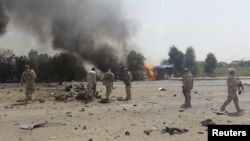U.S. Defense Secretary Ashton Carter attributes the fall of the Iraqi provincial capital of Ramadi to Islamic State forces last week to a lack of will by Iraqi forces to fight. His comments follow President Barack Obama’s assessment that the fight will require "a multiyear commitment."
The Iraqi forces "just showed no will to fight," Carter said on CNN's "State of the Union" program Sunday. "They were not outnumbered. In fact, they vastly outnumbered the opposing force and yet they failed to fight and withdrew from the site."
That raises a question about the willingness of the Iraqis to fight the Islamic State group and defend themselves, the Pentagon chief said. He expressed the hope that, given the proper training, equipment, support and time, the Iraqis will develop the will to fight.
Accusation dismissed
Iraqi lawmaker Hakim al-Zamili called Carter's comments "unrealistic and baseless," according to the Associated Press. He attributed Ramadi's seizure by the group also known as ISIL or ISIS to a lack of good equipment, weapons and aerial support.
But regional analyst Nabeel Khoury of Northwestern University said the U.S. administration must have known for some time one of the biggest problems facing Iraq’s armed forces is corruption.
"The corruption of the armed forces means that a lot of the money allocated by the Iraqi budget for the military does not, in fact, go to the military, but goes to line the pockets of people in government and for generals in the military," Khoury said.
Khoury said that not only has the army'sstrength been inflated, but Baghdad has failed to adequately motivate people to fight in IS-occupied territories. He said he believes Ramadi will, like Tikrit, eventually be recaptured. But the use of paramilitary forces, he said, shows the Iraqi armed forces are inadequate.
'Tactical setback'
In an interview last week with the U.S. publication The Atlantic, Obama acknowledged the loss of Ramadi was a “tactical setback,” and said more training and commitments are needed in Sunni areas. The president said he has always anticipated a multiyear campaign against the Islamic State group.
White House spokesman Josh Earnest echoed that view Friday. He said that would require "looking for areas where we can ramp up the training and assistance that we’re offering, the continued use of targeted airstrikes, the continued investment of our coalition partners in this effort. That’s going to require a sustained commitment."
Defense chief Carter said that while U.S.-led airstrikes are effective, there is nothing the U.S. can do to substitute for the Iraqi forces’ will to fight.
Need 'robust strategy'
The chairman of the Senate Armed Services Committee, Senator John McCain, said on the CBS television program "Face the Nation" that the Obama administration has no strategy for defeating the Islamic State group.
"We need to have a robust strategy," the Republican said. "We need more troops on the ground. We need forward air controllers. Do you know that 75 percent of those combat missions return to base without having fired a weapon? That’s because we don’t have somebody on the ground that can identify a moving target. We need to have a strategy. There is no strategy."
Appearing Sunday on a separate U.S. television program, the House Armed Services Committee's chairman, Congressman William "Mac" Thornberry, was asked if the Islamic State group's fighters were winning.
"They have a lot of momentum on their side," Thornberry said on ABC's "This Week." "You see not only ISIS gaining territory in Iraq and Syria, and I think the map gives it very graphically about their territory expanding, but what a map like that doesn't show is the ideology that continues to grow. So, you've got these sorts of jihadists from Mali, Somalia, Libya, all the way to Afghanistan/Pakistan, who are pledging allegiance to ISIS."
He said if U.S. advisers had been on the ground directing more effective airstrikes, the fight for Ramadi would have been more competitive.
Call to halt foreign fighters
Congressman Adam Schiff, the ranking member of the House Intelligence Committee, said Sunday on CBS’ "Face the Nation" that U.S. strategy should focus on more than just airstrikes.
"I think the more important metrics are how we doing stopping foreign fighters from entering the country," Schiff said. "How are we doing at drying up ISIS’s resources? How are we doing in working with our Gulf allies in fighting the ideological fight with Islam that we’re in position to fight ourselves? And, how are we doing in terms of our military support?"
He said Ramadi's fall indicates "we have a lot of work to keep the pressure on the Iraqi government to fully incorporate the Sunnis, to peel those Sunni tribes away from ISIS."
Michele Flournoy, a former senior defense official in the Obama administration, said the key to pushing Islamic State fighters out of Mosul and Anbar province in Iraq is arming and supporting the Sunni population. She also called for pressuring the Shi’ite-dominated government in Baghdad to devolve more governance and resources to Iraq’s provinces.
Flournoy said that while Americans hesitate to get too deeply involved in Iraq again, the Islamic State group poses not just a threat to Iraq and Syria, but to the United States. She said that with hundreds of foreign fighters flowing to and from the region, the U.S. needs a more forward-leaning posture.




